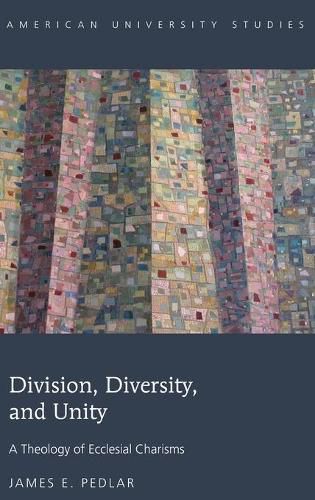Readings Newsletter
Become a Readings Member to make your shopping experience even easier.
Sign in or sign up for free!
You’re not far away from qualifying for FREE standard shipping within Australia
You’ve qualified for FREE standard shipping within Australia
The cart is loading…






This title is printed to order. This book may have been self-published. If so, we cannot guarantee the quality of the content. In the main most books will have gone through the editing process however some may not. We therefore suggest that you be aware of this before ordering this book. If in doubt check either the author or publisher’s details as we are unable to accept any returns unless they are faulty. Please contact us if you have any questions.
The term charism is drawn originally from Pauline literature and refers to a gift given by the Spirit for the upbuilding of the body of Christ. Since the mid-twentieth century, Christians from a broad spectrum of theological positions have applied this term, in varying ways, to groups within the Church. However, no book thus far has provided a rigorous and sustained critical investigation of this idea of ecclesial charisms. In Division, Diversity, and Unity, James E. Pedlar provides such an investigation, drawing on biblical and systematic theology as well as literature on church renewal and ecumenism. Against those who justify denominational separation in order to preserve particular gifts of the Spirit, Pedlar insists that the theology of charisms supports visible, organic unity as the ecumenical ideal. Division, Diversity, and Unity argues that the theology of ecclesial charisms can account for legitimately diverse specialized vocational movements in the Church but cannot account for a legitimate diversity of separated churches. Pedlar tests and develops his constructive proposal against the fascinating and conflicted histories of two evangelistic movements: the Paulist Fathers and The Salvation Army. While the proposed theology of ecclesial charisms stakes out a legitimate and important place in the Church for specialized movements, it excludes any attempt to justify the permanent separation of an ecclesial body on the basis of an appeal to an ecclesial charism.
$9.00 standard shipping within Australia
FREE standard shipping within Australia for orders over $100.00
Express & International shipping calculated at checkout
This title is printed to order. This book may have been self-published. If so, we cannot guarantee the quality of the content. In the main most books will have gone through the editing process however some may not. We therefore suggest that you be aware of this before ordering this book. If in doubt check either the author or publisher’s details as we are unable to accept any returns unless they are faulty. Please contact us if you have any questions.
The term charism is drawn originally from Pauline literature and refers to a gift given by the Spirit for the upbuilding of the body of Christ. Since the mid-twentieth century, Christians from a broad spectrum of theological positions have applied this term, in varying ways, to groups within the Church. However, no book thus far has provided a rigorous and sustained critical investigation of this idea of ecclesial charisms. In Division, Diversity, and Unity, James E. Pedlar provides such an investigation, drawing on biblical and systematic theology as well as literature on church renewal and ecumenism. Against those who justify denominational separation in order to preserve particular gifts of the Spirit, Pedlar insists that the theology of charisms supports visible, organic unity as the ecumenical ideal. Division, Diversity, and Unity argues that the theology of ecclesial charisms can account for legitimately diverse specialized vocational movements in the Church but cannot account for a legitimate diversity of separated churches. Pedlar tests and develops his constructive proposal against the fascinating and conflicted histories of two evangelistic movements: the Paulist Fathers and The Salvation Army. While the proposed theology of ecclesial charisms stakes out a legitimate and important place in the Church for specialized movements, it excludes any attempt to justify the permanent separation of an ecclesial body on the basis of an appeal to an ecclesial charism.